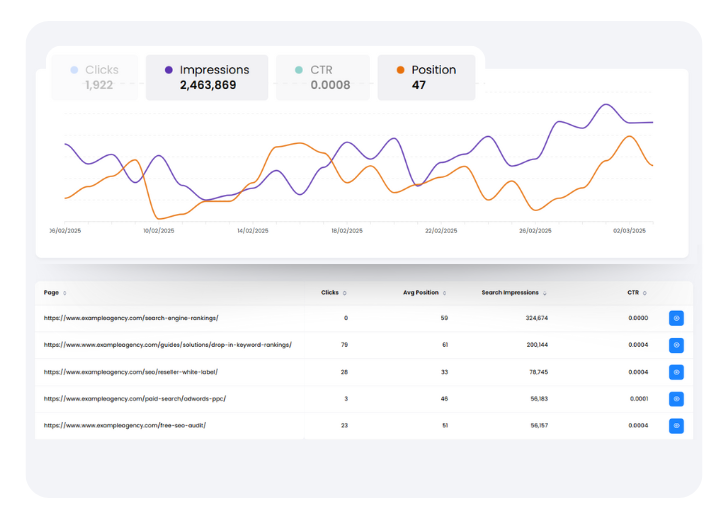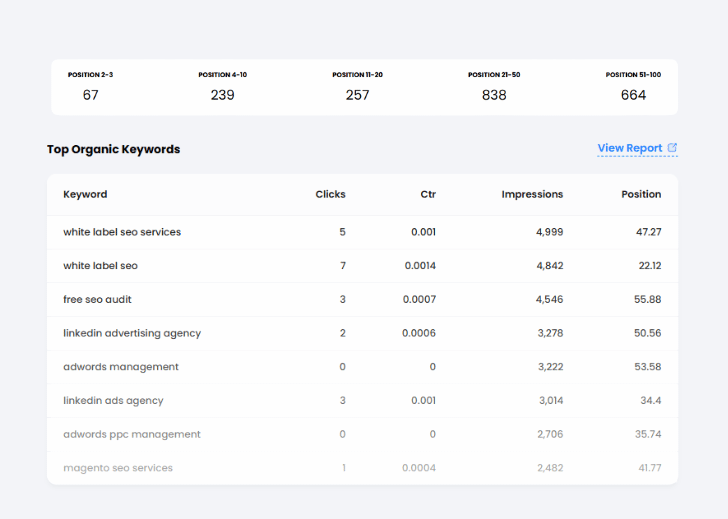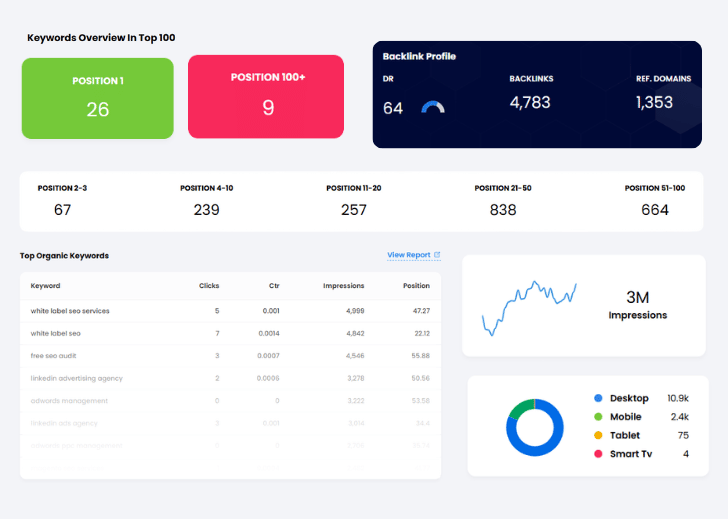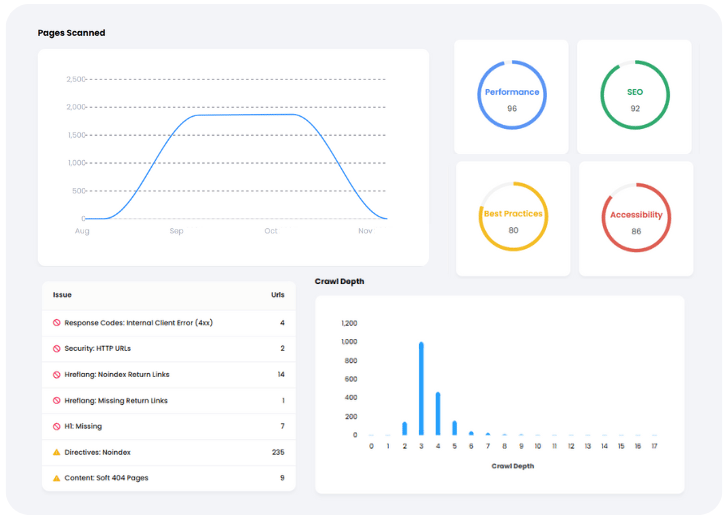A Guide To Advanced SEO Reporting
Whether you’re an agency that provides SEO services to clients or you work in an in-house team, there’s only one way to know if your SEO strategies are working, and that’s through SEO reporting. Regular reports are the best way to tell if your or your clients’ website SEO is improving because of your campaigns and can help inform your next steps to keep results flowing.
If you’re not up to speed with what’s happening when it comes to your website’s performance, keyword rankings, content, and general site health, you will struggle to plan and implement effective campaigns that bring you or your clients great results.
SEO reporting combines actions, data, strategy, insights, site health, and communication into one easy-to-read document. However, there is a catch: producing SEO reports for clients or your bosses can take a lot of time to get right. After all, with so much data to sift through, you want to be certain you’ve included all the relevant stuff.
On that note, here’s everything you need to know about SEO analytics and reporting.

What Is An SEO Report?
An SEO site report provides an overview of certain metrics that show a website’s SEO performance in organic search results. Reporting is the best way to see the impact of your campaigns and will help you make tweaks to your SEO strategies as needed.
You can track whichever metrics you like in your reports, but typically, these are the most important to track search engine success:
- Organic traffic
- Backlinks
- Keyword rankings
- Conversion rate
- Bounce rate
- Page speed
- Top performing pages
SEO reports can come in different formats – they can be digitalised in a dashboard format using specialist SEO software for agencies and in-house teams or be documents like spreadsheets or Word documents.
Most digital marketers produce monthly reports, but some do their reporting more or less frequently, opting for weekly or quarterly reports instead.
What’s Included in an SEO Report?
It doesn’t matter what sort of report you’re producing; it should include the following sections as standard:
- Executive Summary
The executive summary is designed to give senior bosses and clients a quick overview of a report’s main points. You should aim to keep this section easy to understand and use bullet points to make digesting the information even easier.
- Traffic Summary
Organic traffic stats give an overview of how well a website is performing over a period of time. It’s a good idea to include information on the quality and quantity of organic traffic, as well as the source of site visitors. You might choose to include this data as a graph or chart to give readers a clear visual of progress, like how Google Search Console, Google Analytics, and Ahrefs report this.
- Keyword Rankings
Knowing which keywords are driving the most traffic from search engines is helpful. Now, it’s unlikely you’ll want to include every keyword your website ranks for in a report, so it’s best to just focus on a handful for the purpose of a monthly report. Highlight which keywords have improved over a set period and which have declined in rankings over the same period. It’s also a good idea to highlight your keyword position spread, such as how many rank in spots 1 to 5, how many rank in positions 6 to 10, and so on.
Read more: How To Improve Keyword Rankings

Conversions
You should include conversion rate data on how much traffic leads to email signups, sales, or other conversions. This will reveal which content leads to the most conversions and which content might need a refresh to ensure it converts.
- Backlinks
You’ll want to include how many external links a website has gained over the period you are reporting on and the quality of the links. If you find any particularly high authority sites linking to your or your client’s website, you should highlight this in the report as it shows the type of content that high profile websites want to link to, which could encourage the go-ahead for new content to be created. As well as links you’ve gained, keep an eye on those you’ve lost and report on them.
- Content
Being up to speed with how well content is performing is essential. If you or your client devote large chunks of time to creating helpful, informative content, you’ll want to know if it positively impacts your SEO performance. An SEO analysis of the content that is driving traffic and conversions your way should show you what the best-performing piece of content was during the timeframe and the type of organic traffic it attracts.
- Technical SEO
Unless your SEO report is particularly technical SEO-focused, you should keep this section as concise as possible and not get too bogged down in the details. A look at your site speed, mobile responsiveness, and other technical SEO issues like crawling and indexing issues that could impact your SEO rank performance is all that’s needed here.
- Recommended Actions
Your report should provide bespoke recommendations to improve SEO strategies for better performance. This might include low-hanging fruit keywords that you can rank higher for, content that is not performing as well in the SERPs that you can update to make it more relevant, and keywords that competitors are ranking for that you’re not.
It’s always a good idea to make your SEO reporting as accessible as possible, so making things visual where possible is always a good move. Think tables, charts, and graphs to make things easier to understand.
Why SEO Reports Are Important
Regular SEO reporting keeps everyone in the loop about how well a project is going. This type of SEO analysis gives you a clear picture of what’s working and what’s not, which is vital when it comes to impressing search engines.
SEO ranking reports are also important because they can help you:
- Quickly see and react to dips in your traffic and keyword rankings
- See what type of content performs best in the SERPs (search engine results pages)
- Ensure optimal site performance and technical SEO health
- Show the ROI of your SEO efforts
- Secure a bigger budget if needed
- Monitor how well you are doing versus your competitors

A Guide to Creating an SEO Report
There are many steps involved when producing a website SEO report, and below is everything you need to know.
- Choose Your SEO Metrics
In SEO, there are a whole load of metrics you can report on. However, some will be more important to you or your clients than others. Before you get stuck into your SEO report on a website, it’s important that you narrow down the metrics that are important for you. If you’re concentrating on link building as part of your campaign, then it makes sense to include detailed information on the number and quantity of backlinks you’ve acquired over a set period. We’ve already gone over the most important metrics you should be monitoring above as standard, regardless of what the goal is.
- Collect Your Data
Once you’ve established the metrics you’ll be reporting on, it’s time to gather your data. There are lots of platforms out there that can help you collect data for your SEO reports, but to do this, Google Analytics 4 (GA4) and Google Search Console (GSC) are your best friends and the foundation of solid SEO reporting.
Google Analytics 4 is a free SEO report tool from Google. It gives you insights into user visits and interactions on websites and apps. It can also tell you more about where your traffic has come from and how much traffic you’re experiencing, and it can monitor and report on conversion rates. It’s all about user activity. Metrics to track using this tool include number of visitors, average time on pages, cost-per-conversion, and bounce rate.
Google Search Console is another free report SEO tool that you can use to track and troubleshoot your website’s SEO performance. It’s all about Google Search, and digital marketers often use it before getting stuck into projects to carry out an SEO audit to look at crawling, mobile responsiveness, and indexing issues. You can also use Google Search Console to keep on top of organic clicks and click-through rate (CTR). When used with GA4, the two can give you a well-rounded picture of your site’s user experience.
When it comes to your site’s rankings and backlink profile, you’ll also need to gather data relating to these key SEO aspects. A helpful SEO report free tool doing this is Ahrefs. With free features, including a keyword generator, backlink checkers, and website authority checkers, Ahrefs is a popular choice for digital marketing professionals.
Read more in our Ahrefs reports guide.

A Note On SEO Reporting Tools
When looking for the best SEO reporting software and tools for your needs, you need to know what to look for. Every SEO report tool offers something different and has a different focus unless you pick an all-in-one tool that looks at everything from backlink profiles and keyword rankings to organic metrics and click-through rates. Whichever tool you choose, make sure you’re going with a tool that specialises in the area of SEO you want to monitor. User experience is also essential because you’ll need to ensure that you understand how the tool functions and that all information is displayed clearly in a way that works for you.
- Compile Your Report
Once you’ve collected all of the relevant data you need, it’s time to start compiling your report, which takes into account your SEO analysis of the data. As mentioned above, it should begin with your executive summary and conclude with recommended actions. Whatever metrics you’re focusing on, a good web SEO report should be completely tailored to your or your client’s business goals, and it should show progress made over time. Be sure to include useful context so that the metrics you have reported on make sense to whoever is reading the report.
Make SEO Reports Even Easier With Click Insights
Although vital for keeping an eye on how well your SEO campaigns are performing, SEO reporting can be complex and time-consuming. This is particularly true if you use spreadsheets to compile and present your SEO client report data. The good news is that online SEO report tools let you automate the process and help streamline your reporting for more efficient use of your time. One of these SEO reporting tools is Click Insights by Click Intelligence.
Click Insights is an all-in-one SEO reporting tool that uses data from Google Search Console and Google Analytics 4 to give you accurate insights into your keyword rankings, backlink acquisition, wider site performance, and much more so you can make informed decisions that will only benefit your rankings in the SERPs.
One of the leading SEO reporting tools for agencies and in-house teams, Click Insights can also help you with SEO audits of your site’s technical elements and content and highlight areas for improvement. This one tool takes the pressure out of creating an online SEO report, making things easy.
We’re Here To Help With Your Reporting SEO Needs
When compiling SEO analytics reports, there is a lot you need to think about. The main thing is making sure you present your results in a clear way that is easy for clients and bosses to make sense of. Hopefully, the above guide will prove helpful when it comes to your future SEO reports.
If you’re still stuck, the friendly and professional team at Click Intelligence is on hand to help you. We have more than 2 decades of experience working with clients in more than 40 sectors, which makes us one of the UK’s top digital marketing agencies.
Whether you need SEO ranking reports for your clients or your own business, we can do them for you. Transparency is part of our philosophy, and our reports always contain clear data on your metrics with actionable insights that help you make improvements. Want to learn more about how we can help you achieve your goals? Get in touch with our experts today!
